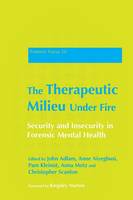This book offers fresh, original and stimulating approaches to engagement with individuals who have been multiply excluded from society and who present challenges to traditional psychiatric models of assessment and treatment. It brings to life the thinking of those working on the frontline in an increasingly difficult environment, and draws together the central themes in working with highly complex and disturbed individuals while retaining psychodynamic understanding of their histories and current circumstances. It offers readers a better understanding of the factors that help and hinder the development and maintenance of effective therapeutic relationships with the socially marginalised, dealing with social exclusion and its consequences in a variety of different treatment settings. Offering a resource of information and clinical insight, this book is essential reading for psychiatrists and psychological therapists, and will also be of interest to frontline workers including doctors, nurses and social workers. This series takes the field of Forensic Psychotherapy as its focal point, offering a forum for the presentation of theoretical and clinical issues. It embraces such influential neighbouring disciplines as language, law, literature, criminology, ethics and philosophy, as well as psychiatry and psychology, its established progenitors.


Reviews
There are no reviews yet.